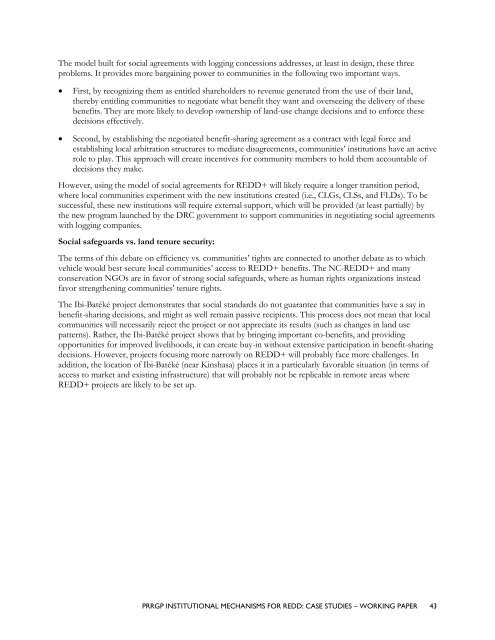Institutional Mechanisms for REDD+ - Case Studies Working Paper
Institutional Mechanisms for REDD+ - Case Studies Working Paper
Institutional Mechanisms for REDD+ - Case Studies Working Paper
Create successful ePaper yourself
Turn your PDF publications into a flip-book with our unique Google optimized e-Paper software.
The model built <strong>for</strong> social agreements with logging concessions addresses, at least in design, these three<br />
problems. It provides more bargaining power to communities in the following two important ways.<br />
� First, by recognizing them as entitled shareholders to revenue generated from the use of their land,<br />
thereby entitling communities to negotiate what benefit they want and overseeing the delivery of these<br />
benefits. They are more likely to develop ownership of land-use change decisions and to en<strong>for</strong>ce these<br />
decisions effectively.<br />
� Second, by establishing the negotiated benefit-sharing agreement as a contract with legal <strong>for</strong>ce and<br />
establishing local arbitration structures to mediate disagreements, communities‘ institutions have an active<br />
role to play. This approach will create incentives <strong>for</strong> community members to hold them accountable of<br />
decisions they make.<br />
However, using the model of social agreements <strong>for</strong> <strong>REDD+</strong> will likely require a longer transition period,<br />
where local communities experiment with the new institutions created (i.e., CLGs, CLSs, and FLDs). To be<br />
successful, these new institutions will require external support, which will be provided (at least partially) by<br />
the new program launched by the DRC government to support communities in negotiating social agreements<br />
with logging companies.<br />
Social safeguards vs. land tenure security:<br />
The terms of this debate on efficiency vs. communities‘ rights are connected to another debate as to which<br />
vehicle would best secure local communities‘ access to <strong>REDD+</strong> benefits. The NC-<strong>REDD+</strong> and many<br />
conservation NGOs are in favor of strong social safeguards, where as human rights organizations instead<br />
favor strengthening communities‘ tenure rights.<br />
The Ibi-Batéké project demonstrates that social standards do not guarantee that communities have a say in<br />
benefit-sharing decisions, and might as well remain passive recipients. This process does not mean that local<br />
communities will necessarily reject the project or not appreciate its results (such as changes in land use<br />
patterns). Rather, the Ibi-Batéké project shows that by bringing important co-benefits, and providing<br />
opportunities <strong>for</strong> improved livelihoods, it can create buy-in without extensive participation in benefit-sharing<br />
decisions. However, projects focusing more narrowly on <strong>REDD+</strong> will probably face more challenges. In<br />
addition, the location of Ibi-Batéké (near Kinshasa) places it in a particularly favorable situation (in terms of<br />
access to market and existing infrastructure) that will probably not be replicable in remote areas where<br />
<strong>REDD+</strong> projects are likely to be set up.<br />
PRRGP INSTITUTIONAL MECHANISMS FOR REDD: CASE STUDIES – WORKING PAPER 43

















